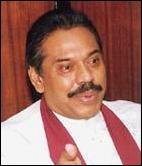Sri Lankan Rebels Say Shocked at President's Stand on Homeland
 Reuters
ReutersFebruary 15, 2006
By Simon Gardner
COLOMBO - Sri Lanka's Tamil Tigers said on Wednesday they were shocked at President Mahinda Rajapakse's rejection of their demands for a separate Tamil homeland, and said it may leave them no alternative but to push for self-rule.
Rajapakse told Reuters in an interview on Monday that a separate homeland -- which the Tigers have said he must grant or face renewed armed struggle -- was out of the question, just days ahead of crunch talks on February 22-23 seen vital to hopes of averting a slide back to civil war.
"The Tamil people are shocked over President Mahinda Rajapakse's rejection of their basic political aspirations in an interview with Reuters," the rebels' Peace Secretariat said in a statement on its official Web site www.ltteps.org.
"(The) LTTE strongly condemns these sentiments expressed by the President that tend to belittle the political rights of the Tamil people ... Hastily going to town without knowing correctly the contradictions and complexities of the Tamil-Sinhala racial conflict, would seriously impact the current efforts for talks."
Next week's talks are seen as a last chance to halt a rash of escalating attacks that killed around 200 soldiers, civilians and rebels in December and January and raised the spectre of a return to a two-decade civil war that killed more than 64,000 people up until a 2002 truce.
Many investors are waiting to see what comes out of the talks before betting on the $20 billion economy, and the stock market has seen volatile trade in recent days. The bourse closed nearly 1.0 percent firmer on Wednesday as investors looked to the talks.
SHARPLY DIVIDED

The Tigers and the government are still sharply divided on core issues such as what degree of power could be devolved to Tamils, and many observers say the best that can likely be hoped for at the talks is trust-building.
Rajapakse also vowed to meet a central rebel demand to rein in armed groups the Tigers say are attacking them in their de facto state in the north and east, and said he was studying Britain's model of devolution. Analysts said both were positive developments.
But with such polar views on the central issue of a separate Tamil homeland, analysts and peace envoys say it will be a long-haul to peace.
"If the Mahinda regime adopts a political stand ruling out the Tamil homeland concept and insists on the resolution of the racial conflict within a unitary constitution, the LTTE would be left with no alternative other than to endeavor hard to respond effectively to the Tamil call for self-rule," the LTTE said.
The government is pushing to amend the terms of the ceasefire -- something the Tigers refuse to do.
"If it (the talks) should fail, I sincerely hope that they will try again. I feel that the situation may be even worse than we had it (in December and January)," Hagrup Haukland, head of the Nordic Sri Lanka Monitoring Mission, told the island's Foreign Correspondents' Association late on Tuesday.
"I don't think that the parties will go back to a full-scale war ... It's beyond my imagination right now."
Copyright © 2006 ABC News Internet Ventures

0 Comments:
Post a Comment
<< Home